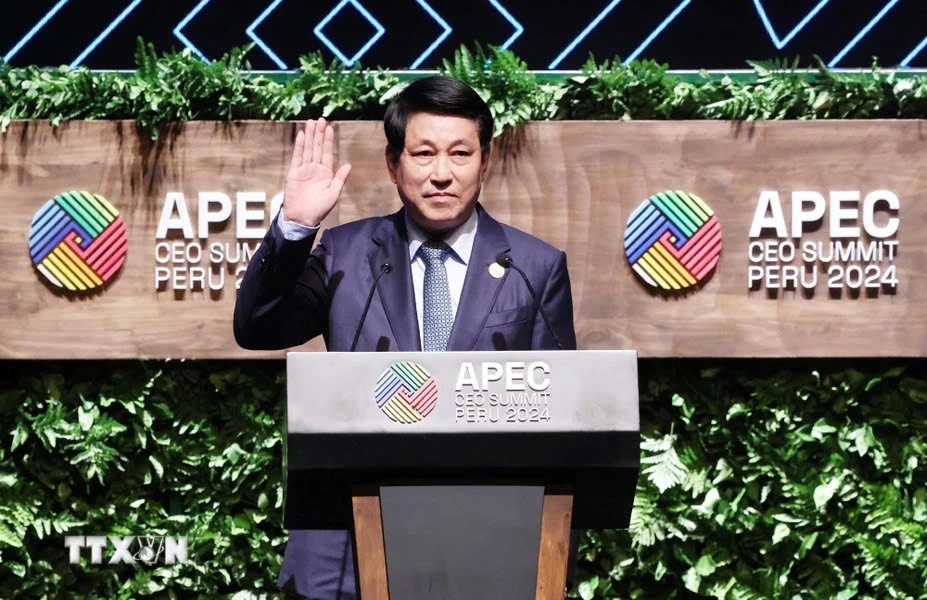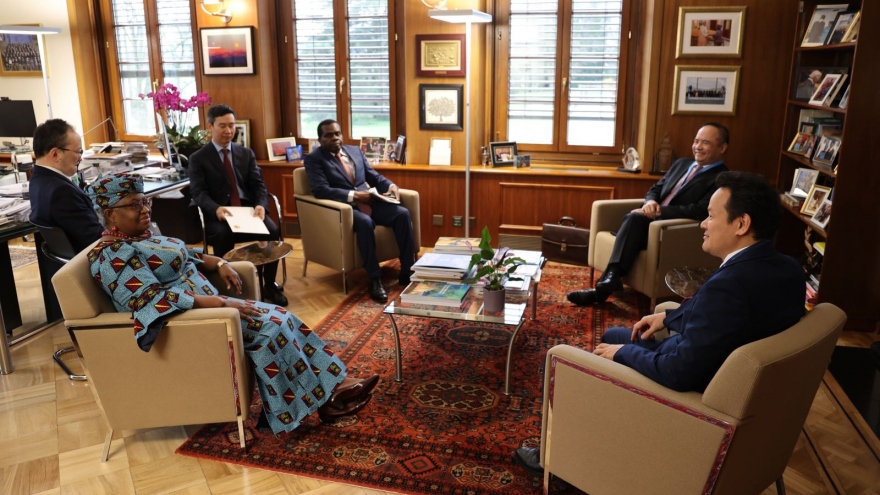Vietnam supports building conducive international economic governance system
VOV.VN - In his speech at the APEC CEO Summit 2024 in Lima, Peru, on November 14, Vietnamese President Luong Cuong outlined the need to build the most conducive international economic governance system for the development of member economies.

According to the Vietnamese President, the world is undergoing significant, transformative changes that have a profound impact on the international political and economic landscape, affecting individual countries and even specific businesses. In such a context, the Asia-Pacific region, a collective of the world’s leading economies at the center of a new technological revolution, serves as a platform to share ideas and build the most conducive international economic governance system for the development of member economies.
To do this, he said it is essential to ensure a peaceful and stable international environment that encourages global trade and investment, as well as economic integration and connectivity. Only when trade is promoted and interconnected, and people are actively involved and benefit, can there be development and prosperity. Conversely, isolation, protectionism, and trade wars will only lead to recession, conflict, and poverty.
“Now more than ever, we need to eliminate the mindset of ‘one side wins, the other loses’ and not allow nationalism to distort policy. In a tightly interconnected world today, where interests are intertwined, all countries, regardless of size, must adhere to international law and act responsibly, as every decision made has significant impacts and can lead to unpredictable consequences.
He stressed the need to ensure that all countries and individuals have equal access to opportunities and can fairly benefit from the fruits of cooperation and development. Alongside achievements, he said globalization has also brought about social inequality and a widening wealth gap.
“To restore and strengthen trust in free trade and economic integration, alongside policies that support workers through vocational training, employment, and social welfare, international trade and investment relations must adhere to World Trade Organization regulations and ensure a balance of interests and fair competition. Imposing new standards on trade and investment without a scientific basis and ignoring the differences in development levels and specific characteristics of countries not only robs hundreds of millions of workers of job opportunities but also stifles creativity and hinders business development,” he said.
Cuong then called for fundamental solutions to be put forward to support the transition to green and clean energy to effectively address climate change, the greatest challenge of humanity today and in future.
This is a complex process that requires a coordinated and harmonious approach to multiple factors, including funding, technology, infrastructure, human resources, as well as institutions, policies, social issues, and economic efficiency. The top priority is to remove bottlenecks related to resources and technology so that developing countries can both expand their energy systems to meet the growing demands of economic and social development and reduce carbon emissions, aiming for a complete transition to renewable energy.
In addition, he said, it is essential to ensure that breakthrough technologies, especially artificial intelligence, are developed and applied in a responsible and inclusive manner, truly becoming a driving force for economic growth and social progress.
In his opinions, “the digital transformation of the world will either narrow or widen the wealth gap between states and within each country, depending significantly on how we manage and utilize artificial intelligence. Therefore, the global governance system for this particularly important field must be built on the guiding principle of balancing the encouragement of development with the assurance of security, safety, national sovereignty, and the moral values of humanity; balancing the common interests of the community with the private interests of businesses; and creating opportunities for all countries to contribute to and benefit from the technological revolution.”
He acknowledged the business community’s crucial role in the remarkable successes of the Asia-Pacific region as a whole and APEC cooperation in particular, and hoped that the business community would collaborate with the governments to turn challenges into opportunities and make those opportunities a reality.
“Your role is always valued, and your voices will always be heard,” he stated.
To make a further contribution, he suggested that businesses should lead the way in innovating business models and production towards green, circular, and digital transformations, becoming a driving force that inspires the development of key sectors of the economy.
“Businesses should increase investment in research and development to promote the advancement and application of breakthrough technologies that address urgent global challenges. They should actively participate in shaping rules and regulations for new and strategically significant areas of the global economy. And last but not least, they should act as a bridge, connecting economies, promoting people-to-people exchanges, and contributing to the building and strengthening of cooperative and friendly relations between nations,” he said.
Talking about Vietnam, the President noted that after nearly four decades of reform and deep international integration, Vietnam has risen from the ashes of war to become a symbol of peace, a bright spot in the global economy, and a land of opportunities. The country is entering a new era, with a fresh mindset and a strong aspiration for a prosperous and happy state, along with firm belief in a bright future.
According to him, Vietnam is a fast-growing, dynamic economy ranked 35th in the world. It is a strong and stable political system centered on the people; is a patriotic, confident, and self-reliant nation with a population of more than 100 million; and has numerous friends and international partners across the globe. It supports the multilateral trading system and the central role of the World Trade Organization, believing in the value of free trade, connectivity, and international integration.
“We will responsibly engage and contribute positively to global politics, the world economy, and human civilization, embodying the spirit that Vietnam is a friend, a reliable partner, and an active and responsible member of the international community,” he stressed.
Calling on international businesses to accompany Vietnam on the journey ahead, he affirmed that Vietnam’s strong development will create many new opportunities for both domestic and international businesses across various sectors, from trade, industry, agriculture, and tourism to infrastructure, logistics, and high-tech industries.
“The Vietnamese market continues to offer numerous benefits and advantages that few places can match for international businesses and investors,” he noted, reasoning Vietnam is a strategic gateway connecting the Southeast Asian market and the Asia-Pacific region with the world. It is a large and promising market, and an attractive destination for the shift in supply chains in the region. It is initiating a new economy, transitioning from a brown to a green economy, and moving from a traditional economy to a digital, startup, and innovative economy.
He expressed his belief that this summit would bring a new fresh breeze of new energy, enabling all member economies to step into a new era of opportunities and successes, an era of a dynamic, innovative, peaceful, and prosperous Asia-Pacific.



